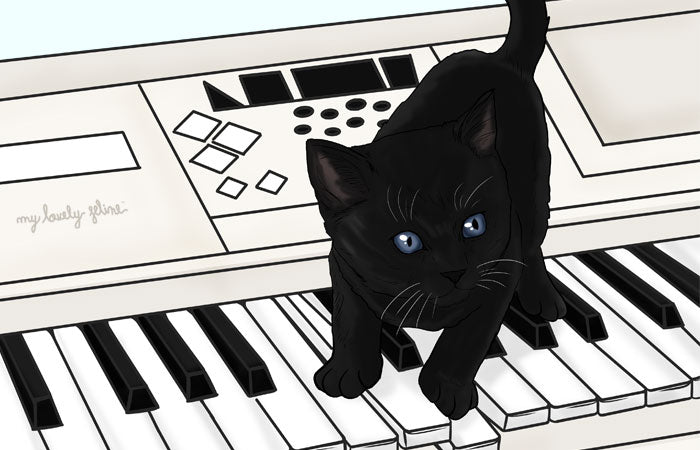—Feline Behavior Specialist 🇺🇸
|
Every time I play classical music on the piano, my cat Dolly typically jumps onto the keys and then the top of the upright piano, where she rolls around a bunch and eventually falls asleep. She has become such a fixture that my piano teacher fully expects her presence during our video lessons. When I play jazz or other genres, she’s disinterested, so what is it about classical music that Dolly enjoys? 🎹🐈 |
Let’s take a look at how cats hear compared to humans.
Although we can hear frequencies 20-20,000 Hz, cats hear 45-64,000 Hz, 1.6 octaves higher than us, and are among mammals with the best hearing. Since they hear sounds 4-5x farther away than humans, you can see why it’s important to be mindful of the volume and pace of all sounds and music.
If you’re playing upbeat music, it could cause your cat unnecessary stress, because the music sounds different and more intense to them. The best way to compare it to our hearing is to think about your response walking into a bar or restaurant with really loud music – it feels intense and almost painful, and makes it difficult to hear people talking and can even make your head throb.
Cats’ ears rotate up to 180 degrees, plus, they can also detect differences in tone as small as 1/10, allowing them to pinpoint the location of a sound within three feet in only .06 seconds! Compare that to hearing a sound in your home and trying to figure out where it’s coming from. We often need to hear it repeatedly and even then, we can have a difficult time even figuring out what room it’s in.
This sensitivity to changes in tone answers the question why Dolly doesn’t like jazz, which often has a mix of tonalities (and if it’s a produced piece, a lot of instruments). It’s probably too intense for her and sounds unappealing and just like noise.
But why does Dolly like classical music? One study showed cats had lower stress during surgery when listening to classical music, intermittent stress with pop, and were most stressed with heavy metal. Indications are that lower tones and slower tempos are stress reducing in cats.
This doesn’t cover all classical music, however, since some composers create more lively tunes. You’ll have a better bet of de-stressing your cat with Bach or Hӓndel than Mozart or Rachmaninoff. The closer the music is to the frequency and sounds cats use to communicate, the more positively it will be received, and cats most like to vocalize in higher frequencies.
There are pieces of music composed specifically for cats. Yes, you read that correctly. The emotional centers of the brain occur shortly after birth when a cat is nursing, so in cat music, purring and suckling sounds are combined with tempos and frequencies similar to what cats use when vocalizing.
A tempo of 1380 beats per minute (BPM) is the same as purring, and 250 BPM is the same as nursing. One study compared stress levels during a cat’s physical exam with cat music, classical music and silence. The cat music decreased stress the most.
The implications of this go beyond the surface. The idea is if we can reduce their stress with music, it could help decrease the amount of medications used overall, before vet visits, or even during surgery. I also can’t help but think about how much it can help in a shelter environment, which is full of stressed animals.
Conclusion
I personally play a lot of mediation music for tense cats, and I’ve definitely watched them go from tense to relaxed. My guess would be meditation music has some similar frequencies to what they like, and it’s certainly not overly loud or intense.
If you have a stressed cat, it’s recommended to play cat-specific music (or at least calm music) at least an hour a day. Or, if you’re like me, you now have another reason to practice the piano daily.
Sources
Care, The Benefits of Music for Cats
Classic FM, Official: cats find classical music relaxing
Cnet, The right music can soothe your savage beast, err cat
The Spruce Pets, All About Sense of Hearing in Cats
Cats On Broadway Hospital, The Five Senses According to Cats: Hearing
Cat Sonics, Our work on musical compositions
Animal Planet, Cat Ears & Hearing
Article by Elizabeth Italia 🙋♀️
Cat Behavior & Fostering Specialist



